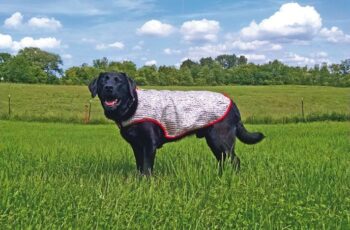Canine kennel cough is an infection of the upper respiratory tract, specifically the nose, eyes, throat, and trachea. It is also known as infectious tracheobronchitis (ITB) or Canine Infectious Respiratory Disease Complex (CIRDC) – and it’s as ubiquitous in dogs as the common cold in humans. In fact, kennel cough is spread among dogs much the same way that upper respiratory illnesses are transmitted among people. Fortunately, there are more vaccinations that can prevent kennel cough (or reduce the severity of the illness) in dogs than there are vaccines that can prevent colds in humans!
Causes of kennel cough
There are several bacteria and viruses that are responsible for kennel cough. A dog may be infected with only one of these organisms but often have a co-infection of two or more pathogens

Bordetella bronchiseptica is a bacteria that can cause kennel cough. It can either be the sole agent of a dog’s illness or it can cause infection secondary to a virus.
Mycoplasma is a bacteria that exists naturally in the respiratory tract of most dogs. But in the presence of another primary agent of kennel cough (like B. bronchiseptica or a virus), it may contribute to a dog’s clinical signs.
There are also several viruses that can cause kennel cough. These include canine adenovirus-2 (CAV-2), canine parainfluenza virus (CPiV), canine herpesvirus (CHV), and canine distemper virus (CDV). Canine coronavirus can also cause kennel cough but has no relation to the coronavirus that causes COVID-19 in people. The canine influenza viruses H3N2 and H3N8 have also been implicated in cases of kennel cough but are not the same as the influenza viruses that cause seasonal flu in people.
Once a dog is ill with one of the primary agents of kennel cough, they can develop a secondary infection with one of the other primary agents or with an opportunistic bacteria. These opportunistic bacteria include Pseduomonas, Pasteurella, or the coliform class of bacteria.
Kennel cough is spread by close contact with infected dogs and their respiratory secretions. Respiratory secretions include aerosolized droplets from sneezing or coughing and saliva or nose and eye discharge that is left on bowls, blankets, floors, walls, and people’s clothes. It can be easily spread between dogs that attend doggie daycare, go to dog parks, or go to the groomer or attend training classes.
Just like with humans and the common cold, there is a period of time where dogs may be shedding one of the organisms responsible for kennel cough but are not yet showing signs of illness. This is called the incubation period. The incubation period varies by organism and can be as short as two days and as long as 14 days.
Vaccinating against kennel cough is important
One of the best ways to minimize the risk of contracting kennel cough is to ensure that your dog is properly vaccinated. Vaccines are available for B. bronchiseptica, CAV-2, CPiV, CDV, and both canine influenza strains.
The vaccine for B. bronchiseptica is available in three forms: an injectable form as well as intranasal and oral forms. The intranasal form is available for just B. bronchiseptica or is combined with the vaccine for CPiV. This vaccine is given once initially and then is boostered annually.
The vaccines for CDV and CAV-2 are combined with the vaccine for canine parvovirus. This vaccine is commonly known as the DAP vaccine (for distemper, adenovirus, and parvovirus). There is a version of this vaccine that includes CPiV. This combination vaccine is given every two to four weeks to puppies as young as six weeks old until they are sixteen weeks of age. It is boostered one year after the last puppy dose and then every three years after that.
The canine influenza vaccine provides some protection against both strains that have been identified in the United States. This vaccine is given initially as a two-dose series two to four weeks apart and then boostered annually.
It is important to remember that no vaccine is 100% effective. It is still possible to develop kennel cough even when fully vaccinated. If your dog’s infection is being caused by an organism for which they are vaccinated, then their illness will likely be milder and their recovery time should be shorter.
Other prevention strategies
Unfortunately, neither we nor our dogs can live in a bubble to protect us from contracting respiratory illnesses. But there are some basic steps we can take to prevent the spread of kennel cough.
Talk to your doggie daycare provider about their infectious disease prevention protocols. Most reputable daycare providers have a documented cleaning strategy that is executed multiple times a day with periodic deep cleanings that are completed at least once a week. These providers also require proof of vaccination for each attendee. They should inquire with each dog parent about any recent coughing or sneezing before admitting a dog to the facility for the day.
You can also be proactive when setting up doggie play dates for your pooch. Ask each dog’s owner about their dog’s vaccination status and if their dog or any other dog in the family is or has been recently ill. Organisms that cause kennel cough can be shed in a dog’s respiratory secretions for up to 14 days after their clinical signs resolve. If there is any doubt about another dog’s health status, you have the power to protect your dog and reschedule the play date!
When it comes to dog parks – well, there is no way to know whether all of the dogs who have been brought to the park have been vaccinated or kept from the park when potentially shedding a virus or bacterial cause of kennel cough.
If your dog frequents the groomer, pick a facility that has a documented cleaning protocol for tables, cages, and grooming tools. You can also minimize your dog’s exposure to potential pathogens by picking up your dog from the grooming facility as soon as their spa treatment is complete.
During the warmer months, dog-friendly shopkeepers set bowls of water outside their shops to help keep our dogs hydrated on warm days. While this is a super nice gesture, these bowls provide a potential way to spread organisms that cause kennel cough in our dogs. Bring your own dog bowl and water and offer water to your pooch often while you are out on the town.
We cannot completely prevent all the potential causes of kennel cough – but we can minimize their risk of exposure to pathogens and the severity of their illness should they become ill. By being a proactive dog parent, you have the power to keep your dog safe and healthy!


